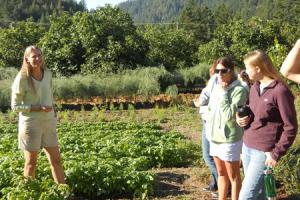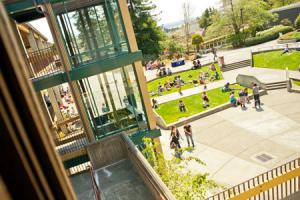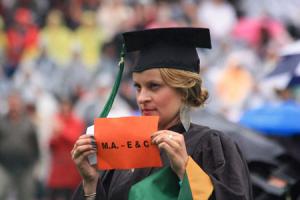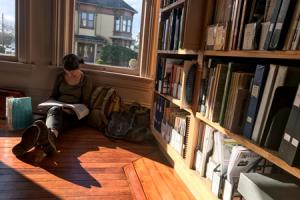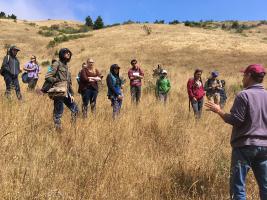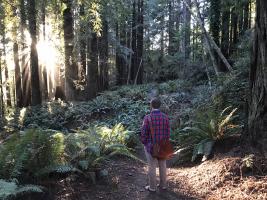Fall 2016
* Unless otherwise noted, events are 5:30pm-7:00pm Thursdays in Art B 102 *
September 15
Sharon Kramer
“State of the Science on Environmental Issues and Marine Renewable Energy”
Dr. Sharon Kramer is a principal at H. T. Harvey & Associates, and heads its North Coast office and the Fish and Aquatic Ecology team. She has more than 25 years of experience in aquatic ecology and fisheries biology in the Pacific Northwest, California, Australia, and Hawai‘i. Sharon is well-versed in fish and aquatic habitat restoration and monitoring, and project permitting, with extensive federal Endangered Species Act work. Her most recent focus has involved assessing and mitigating the environmental effects associated with marine renewable energy projects. Sharon has her PhD, Marine Biology, University of California, San Diego, Scripps Institution of Oceanography, MS, Zoology, University of Hawai‘i, Mānoa, and BA, Aquatic Biology, University of California, Santa Barbara.
September 28 *Wednesday in the UC Banquet Room
Alexander Schunka
“Water Use and Water Management in Early Modern Europe”
Alexander Schunka is Professor of Early Modern History at the Friedrich Meinecke Institute of the Freie Universität in Berlin. His doctoral dissertation (2004) at the University of Munich addressed religious migrations in the early modern era. He has taught at the universities of Stuttgart (2004-09) and Erfurt (2009-15). His main research interests focus on the religious and cultural history of early modern Europe (Central Europe, Britain, East-Central Europe as well as the Ottoman Empire). More specifically, his research addresses the history of early modern migrations, the history of natural resources, transcultural encounters between the Ottoman world and Central Europe, and intellectual and religious transfers between English and German Protestants in the seventeenth and eighteenth centuries, among other topics. Publications include two monographs (a third monograph is currently in print), a number of edited volumes, about 70 articles in journals and edited volumes (mostly in German and English), and about 80 book reviews. Watch full presentation
October 6
Andy Baker
“Saved By The Gyres: Ocean Source Heat Pumps Cut Heating Costs and CO2 Emissions in Coastal Alaska Cities"
Andy Baker is a registered professional engineer in Alaska and owner of YourCleanEnergy consulting in Anchorage. He has significant experience in the financial evaluation and design of renewable energy systems and energy efficiency improvements. He has lived and worked in Alaska since 1998 and has focused for the past twelve years on identifying and designing cost effective renewable energy systems for commercial, municipal, and community clients. He has been the organizer of the annual Anchorage Solar Tour from 2009 thru 2016. Andy is a graduate in environmental engineering from Penn State University and worked previously as a project engineer for Buchart-Horn in Pennsylvania; Black & Veatch in San Diego, Lusaka, and Boston; and for HDR Alaska in Anchorage.
Andy's work focus since 2009 has been on ocean source heat pumps systems for large facilities, and for district heating in coastal Alaska. He has worked with the Alaska SeaLife Center in Seward for the past seven years to evaluate, design and monitor a large sea water heat pump system that has now effectively replaced 98% of local fossil fuel use with ocean source heat pumps. This high profile demonstration project was designed and constructed in three phases and features conventional heat pump systems using synthetic (R-134a); and cutting edge trans-critical heat pumps using a natural refrigerant (R-744 or CO2). The project combines the science of ocean gyres and an amazing natural refrigerant to produce a clean energy solution with an exciting and sustainable future for many northern coastal cities of the world. Watch full presentation
October 13
Alex Eaton
"Waste to Energy to Market"
Alexander Eaton is the co-founder and CEO of Sistema Biobolsa, a company that fabricates, distributes, finances and services small-scale biogas systems in Latin America. Based in Mexico, the company is currently growing into new markets. Alex is also the co-founder of the Latin America Biogas Network and the Mexico Biogas Program of the International Renewable Resources Institute. He has been supported in his work as an Ashoka Fellow and Switzer Environmental Leadership Fellow and through the USDA, US EPA, and the Mexican government. Alex has a BA in journalism from Western State College of Colorado and an MS from the Energy Technology and Policy master's program at Cal Poly Humboldt, where his master's thesis focused on the development of the Sistema Biobolsa concept. Watch full presentation
October 20
Lee Pera
"Tiny Houses: A Fad or the Future of Housing?"
Lee Pera is a geographer, educator and community organizer. In addition to building her own tiny house and setting up the nation's first tiny house community in Washington DC, Lee has worked with communities throughout Latin America and the U.S. on urban infill, land tenure, and sustainable community development. As a geographer with the US Environmental Protection Agency, she enjoys making maps and telling stories with data.
Lee is a founding member of the Tiny House Collaborative and works with cities and communities to plan how tiny houses and other mobile structures can be incorporated into affordable housing strategies and creative arts spaces. She teaches workshops around the country on tiny houses. Her talk will address the tiny house movement, its origins, its demographics, and its role in the changing housing landscape in the United States. She holds Master's degrees in Geography and Public Policy from the University of Oregon and has been featured in numerous media outlets, including NPR, the Washington Post, Atlantic Cities, Dwell, Architectural Record, CNN, and ABC. Watch full presentation
October 27
Jason Mark
"Where in the Wild? The Search for Wilderness in the Anthropocene"
In the 21st century, on the verge of what some are calling the Anthropocene, is there any place that's still really, truly wild? And, if so, how can we hold onto wildness as a touchstone for our relationship with the rest of nature? In this lecture environmental journalist Jason Mark, editor in chief of SIERRA magazine, will share some thoughts from his 2015 book, Satellites in the High Country, and will explore the meaning of wilderness today.
Jason Mark is the author of Satellites in the High Country: Searching for the Wild in the Age of Man and the editor in chief of SIERRA, the national magazine of the Sierra Club. His writings on the environment have also appeared in The New York Times, The Nation, TheAtlantic.com, and Salon.com among many other publications. He is a co-founder of Alemany Farm, an urban farm in San Francisco.
November 3
Terry Surles
"An Update on U.S. Energy Policy and Related Technology Development"
Dr. Surles has a distinguished career in energy and environmental management and consulting positions. Since 2012, he has been at the University of Hawaii as Lead for Sustainable Energy and Environmental Solutions and as Senior Advisor to the California Institute for Energy and Environment (CIEE). During this time, he has also served as an expert for APEC and IEA in Indonesia, China, Vietnam, Peru, and Korea and has worked on an analysis of DOE’s Grid Modernization Initiative for Booz, Allen, Hamilton. From 2010 to 2012, as Desert Research Institute Vice President, he led program development and management for three research divisions and four research centers in environmental and energy sciences. From 2006 to 2010, he was the Technology Integration and Policy Analysis Program Manager at the Hawaii Natural Energy Institute focusing on grid integration of variable renewable resources and electricity storage technologies. He was simultaneously a senior advisor at CIEE focusing on carbon capture and storage. From 2004 to 2006, he was Vice President at EPRI focusing on air quality, health, energy/water nexus, and climate change issues. From 2000 to 2004, he was on loan to the California Energy Commission as the Public Interest Energy Research Program Director from Lawrence Livermore National Laboratory (LBNL) where he had been Associate Laboratory Director for Energy Programs from 1998 to 2000, focusing on energy efficiency, energy storage, and climate change science and analysis. In 1997, he was appointed by Gov. Pete Wilson to be Deputy Secretary for Science and Technology at California EPA. From 1978 to 1997, he was at Argonne National Laboratory (ANL) with his final position being General Manager for Environmental Programs. Major programmatic areas included energy systems assessment, climate change science, risk analysis and assessment, emergency planning and response, and energy and environmental modeling.
Dr. Surles received his PhD in Chemistry from Michigan State. He has more than 300 publications, technical reports, and presentations to his credit. He has served on a number of committees, including seven appointments with the National Research Council as well as DOE and its laboratories. In addition to those listed above, he has consulted for the Northeast Asia Economic Forum, East-West Center, the United Kingdom Energy Research Centre, and the State of Victoria.
November 10
Sarah Wald
“A Universal Killer? Rachel Carson's Silent Spring and the United Farm Workers' Pesticide Campaign”
Sarah D. Wald is Assistant Professor of Environmental Studies and English at the University of Oregon and the author of The Nature of California: Race, Citizenship, and Farming since the Dust Bowl. Wald, an interdisciplinary scholar of US literature and culture, holds a PhD in American Studies from Brown University. She focuses on the relationship between race and the environment with a particular interest in comparative approaches to Asian American and Latina/o Studies. She has published articles in Food, Culture, and Society, Western American Literature, and Díalogo. Her scholarship has appeared in Service Learning and Literary Studies in English, Asian American Literature and the Environment, American Studies, Ecocriticism, and Citizenship: Thinking and Acting in the Local and Global Commons, and The Grapes of Wrath: A Reconsideration.
The history of the United Farm Workers is entangled with the rise of mid-century environmentalism. This talk considers the complex ideological relationship between mainstream environmentalism and the farmworkers movement in the 1960s and 1970s, paying particular attention to the environmentalist perceptions of the UFW, the UFW’s pesticide campaigns, and Rachel Carson’s Silent Spring.
Watch full presentation: http://humboldt-dspace.calstate.edu/handle/10211.3/192847

